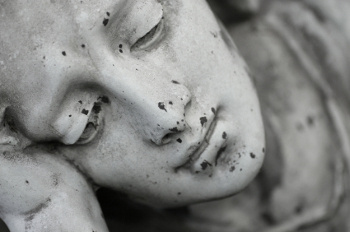
It’s a timeworn theme, dying of a broken heart. The poet of the Psalms recognized that “by sorrow of the heart the spirit is broken” (Psalms 15:13). In Shakespeare’s Antony and Cleopatra, a broken heart takes Enobarbus. In Gilbert and Sullivan’s The Yeomen of the Guard, it takes Jack Point. More recently (and non-fictionally), some imply it hastened the death of Johnny Cash. Reports of dying of a broken heart have appeared in recent news, old news, and ancient narrative.
Beyond poetry, anecdote, and observation, heart specialists and medical researchers are recognizing a physiological basis for dying of a broken heart.
In 2000, Japanese cardiologists noticed something odd about several victims of cardiac arrest. A typical heart attack results from deterioration of the heart and arteries, cholesterol buildup, diabetes, alcoholism, embolism, or some other factor. But these patients showed little or no sign of cardiovascular disease. EKG imaging revealed an unusual problem: a partial malfunction of the left ventricle caused the tip of that heart chamber to bulge instead of contracting. On the EKG, the ventricle resembled, to the Japanese doctors’ eyes, a “tako-tsubo”—an octopus trap. Hence the syndrome’s first name: Takotsubo cardiomyopathy.
In Broken Heart Syndrome, a heart reacts adversely to stress hormones and stops pumping correctly. Dr. Scott Sharkey of the Minneapolis Heart Institute refers to it as a “concussion” of the heart. In rare cases it’s fatal.
The stress can come from anything—the end of a relationship, the loss of a job, the death of a loved one. Takotsubo cardiomyopathy may be involved in some cases where one member of a couple dies and the other seems to waste away from grief, sometimes dying soon after. Aurlo and Virginia Bonney, married for 65 years, died within eight days of one another. “He didn’t look like he wanted to be here,” Donna Leggett, activities director at the Bonneys’ retirement home, told MSNBC, describing the surviving husband. “I didn’t see any joy, humor, a desire to even eat. I think he was lost.”
Stress can overwhelm a heart when a job is lost. Three steel workers in New York state died of heart attacks within weeks of each other recently. None was over 56 years old. All had just been laid off. One Yale study found that in older workers, layoffs bumped up the risk of stroke and heart attack by more than 100%. Another researcher observed an 83% increase in stress-related health issues among workers who’d lost their jobs.
The odds a person will have Broken Heart Syndrome in a year are 1 in 25,010. While that may seem relatively high—those are roughly the odds a person in Kansas will be murdered in a year—the odds a person will die of it in a year are only 1 in 2,345,000. It’s about as likely as going accidentally overboard on a cruise (the odds being 1 in 2,309,000).
If that’s not reassuring enough, consider two facts. First, a typical heart attack, complete with coronary artery disease, is far more likely than a literally broken heart: the odds an adult 35 or older will have a heart attack in a year are 1 in 171.3, and the odds a person will die from heart failure in a year are 1 in 1,031.
Second, while Broken Heart Syndrome can be mistaken for a myocardial infarction, it is not one. It is not caused by blocked arteries, so no arterial bypasses are required. With treatment, almost all patients make a full recovery: the odds a person will survive Broken Heart Syndrome are 1 in 1.01 (99%). Only a heart-breaking few will die from it.